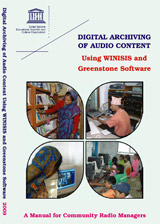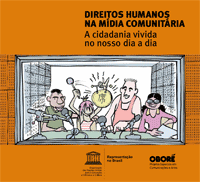Cultural diversity is seen as part of humanity's common heritage, which, as a source of exchange, innovation and creativity, is as essential for humankind as biodiversity is for nature. It should therefore be protected for the benefit of both present and future generations and be considered as a basic human right.
Publication year: 2003
This publication is a self-instructional handbook aimed at helping managers of community radio stations, FM radio stations, public service broadcasting agencies and any other organizations that deal with audio files in creating prototype archives of digital audio documents.
Publication year: 2009
Human Rights in Community Media: Citizenship in Our Daily Life presents basic notions of civil, political and social rights, together with other issues. It is available exclusively in electronic version, free for download.
Publication year: 2009
This publication is prepared by the International Telecommunication Union and Orbicom, the Network of UNESCO Chairs in Communications. This is a contribution to the international community in the context of the second phase of the World Summit on the Information Society (WSIS), Tunis 2005.
Publication year: 2005
These Guidelines form a small part of a far-seeing campaign by UNESCO to improve access to digital heritage for all the world’s peoples, and to ensure that the means of preserving their digital heritage are in the hands of every community.
Publication year: 2003
The present publication offers the user information about States’ ratifications of, accession to and succession to major human rights treaties, both universal and regional. Published annually, it shows the development of the ratification process of these normative instruments. As comments to previous editions have confirmed, this publication has proven to be useful for decision-makers, media professionals, researchers, activists and all those who are committed to human rights.
Publication year: 2006
This well-established book has been revised and updated to reflect recent developments in the field of human rights. The first part responds to 113 questions on the topic. In the second part, the 30 Articles are quoted and explained, including background information and examples. The book also includes notes that give more detailed information about individual states and their position.
Publication year: 2004
Written by Daniel Pimienta, Daniel Prado and Alvaro Blanco, this publication is an update to the previous UNESCO study on this subject that was issued for the World Summit on the Information Society in 2005.
Publication year: 2009









